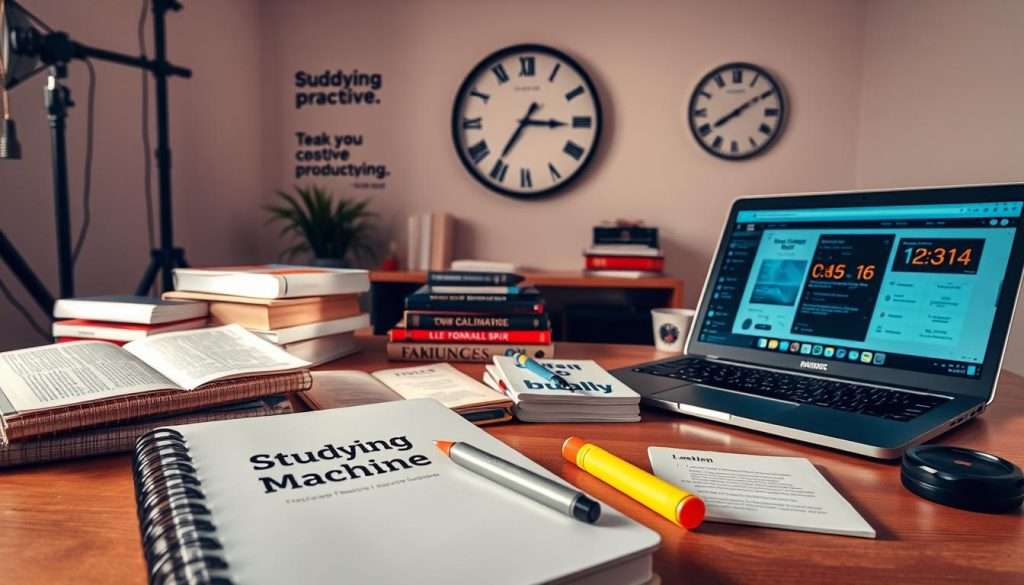Ever wondered what makes top performers stand out? It’s not just natural talent. It’s the result of deliberate practice. By using a structured method, you can break through your limits and master skills.
So, what is deliberate practice? It’s a focused way to improve. You get instant feedback to work on specific skills. This method sharpens your abilities and moves you closer to your goals.
In this article, we’ll dive deeper into deliberate practice. You’ll see how it can unlock your full potential and lead to ongoing growth.
Key Takeaways
- Deliberate practice is a systematic approach to skill development.
- It involves pushing beyond current limits and receiving constructive feedback.
- This approach helps refine skills and achieve significant progress.
- Deliberate practice is key to unlocking exceptional performance.
- It enables continuous improvement and skill mastery.
Understanding Deliberate Practice: Definition and Principles
Deliberate practice is more than just doing something over and over. It’s a focused way to get better. It’s about being intentional with your practice, knowing what you’re doing, and adjusting as needed. When you practice deliberately, you aim for specific goals, not just going through the motions.
The Science Behind Skill Acquisition
The science shows that deliberate practice is crucial for becoming an expert. Our brains change when we learn new skills, and deliberate practice helps this process. By focusing on specific skills and getting feedback, you learn faster.
Deliberate Practice vs. Regular Practice
So, what makes deliberate practice different from regular practice? Deliberate practice is structured and has clear goals. It’s not just about spending time; it’s about using that time well. Regular practice can feel like just going through the motions, but deliberate practice keeps you focused on getting better.
By using deliberate practice techniques in your routine, you can see big improvements. You’ll get better faster and perform better. As Anders Ericsson, a top expert on this topic, said, “The main difference between a novice and an expert is not just the amount of time they’ve spent practicing, but the quality of that practice.”
“The main difference between a novice and an expert is not just the amount of time they’ve spent practicing, but the quality of that practice.”
The 5 Core Elements of Deliberate Practice
Deliberate practice is more than just spending hours practicing. It’s about using specific strategies to improve your skills. Knowing these key elements is essential on your journey to becoming an expert.
Specific, Well-Defined Goals
Setting specific, well-defined goals is the first step. It helps you focus on what you want to achieve. For example, a musician might aim to learn a new piece, breaking it down into smaller parts.
Full Concentration and Effort
Full concentration and effort are vital for progress. It’s not just about doing something; it’s about doing it with all your might. As Anders Ericsson says, “The key is not just practicing, but practicing with full concentration and effort.”
“The key is not just practicing, but practicing with full concentration and effort.” – Anders Ericsson
Immediate and Informative Feedback
Getting immediate and informative feedback is crucial. It shows you where you need to improve and helps you adjust your practice. This feedback loop is what makes deliberate practice so effective.
Getting Out of Your Comfort Zone
Deliberate practice means getting out of your comfort zone. It’s about pushing yourself beyond what you can do now. This is where you grow the most.
Systematic Approach to Improvement
Finally, a systematic approach to improvement is key. It means planning your practice, tracking your progress, and making changes as needed. This structure helps you improve in a methodical way.
By using these five elements in your practice, you’ll be well on your way to mastering your skill. Remember, deliberate practice is not just about time. It’s about practicing with purpose and intention.
The Neuroscience of Deliberate Practice
Exploring the neuroscience of deliberate practice reveals how we become experts. It’s not just about doing the same thing over and over. It’s about how our brains learn and adapt to new information.
Myelin and Skill Development
Myelin, a fatty substance, is key for skill development. As we practice, myelin builds up around neurons. This speeds up and makes neural transmissions more accurate. It’s essential for mastering complex skills.
Neuroplasticity and Expert Performance
Neuroplasticity, or the brain’s ability to change, is crucial for experts. Through deliberate practice, our brains form new connections. This helps us adapt and improve our skills. It’s what makes experts stand out.
The 10,000-Hour Rule: Myth vs. Reality
The idea that 10,000 hours are needed to master a skill is often debated. While the exact number is up for discussion, one thing is clear. Consistent, focused practice is key for expertise. It’s the quality of practice, not just the quantity, that matters.
| Aspect | Description | Impact on Skill Development |
|---|---|---|
| Myelin | Fatty substance around neural pathways | Enhances neural transmission speed and accuracy |
| Neuroplasticity | Brain’s ability to reorganize | Allows for adaptation and skill refinement |
| Deliberate Practice | Focused, structured practice | Drives myelin growth and neuroplasticity |
Understanding the science behind deliberate practice shows its value. A deliberate practice mindset and the right strategies can greatly improve our skill acquisition. This leads to achieving expertise.
How to Design Your Deliberate Practice Routine
A deliberate practice routine is more than just putting in hours. It’s about practicing with purpose. To master a skill, you must practice with intention. This means knowing your current skill level, finding areas to improve, and planning your practice sessions for the best results.

Identifying Your Specific Skill Gaps
To begin, find the areas where you need to get better. Look at your current skills and see where you’re short. For example, if you’re learning a new language, you might struggle with grammar, vocabulary, or pronunciation. Be honest with yourself about your weaknesses to focus your practice well.
Creating Measurable Micro-Goals
After finding your skill gaps, set measurable micro-goals. These are small, reachable goals that help you see your progress. For instance, if you’re learning a new instrument, a micro-goal might be to learn a specific piece or technique in a certain time. Breaking down big goals into smaller ones makes them easier to handle.
Structuring Practice Sessions for Maximum Benefit
It’s important to structure your practice sessions well. This means setting aside specific times to practice, avoiding distractions, and focusing on the hardest parts of your skill. For example, if you’re an athlete, your practice might include drills to improve your technique. Here are some deliberate practice tips to remember:
- Set clear objectives for each practice session.
- Use tools and resources that provide immediate feedback.
- Practice at the edge of your ability, where it’s challenging but not impossible.
Tracking Progress Effectively
Tracking your progress is key to knowing if your practice routine is working. You can keep a journal, use apps, or work with a coach for feedback. Regularly checking your progress lets you adjust your routine as needed. For deliberate practice examples, think about how athletes or musicians use data and feedback to improve.
By following these steps and staying committed, you can make a deliberate practice routine that helps you reach your goals. The main thing is to practice deliberately and consistently over time.
Deliberate Practice Techniques for Different Domains
Deliberate practice can help you reach your full potential in any field. It’s not a one-size-fits-all method. Instead, it’s flexible and works for creative, physical, and cognitive skills.
For Creative Skills: Music, Writing, Art
For creatives, deliberate practice means doing focused exercises. Musicians might practice hard parts of songs over and over. Writers can work on writing better dialogue or descriptions.
Artists might practice shading, mixing colors, or working on composition. These exercises help improve your craft.
For Physical/Athletic Skills
Athletes can use deliberate practice to get better at specific skills. They might practice a tennis stroke or work on their sprint starts. The goal is to improve each part of a complex movement.
For Cognitive/Intellectual Skills
For those in cognitive fields, practice involves solving tough problems or memorizing. Programmers might do coding challenges. Chess players study famous games to get better.
The aim is to tackle tasks that are just a bit too hard. This helps you grow.
By using deliberate practice tailored to your field, you can make big improvements. Always aim to push yourself a little harder than you’re comfortable with.
Developing the Deliberate Practice Mindset
The deliberate practice mindset is what sets apart those who truly master something from those who just go through the motions. It involves embracing challenges, being patient, and staying motivated.
Embracing Discomfort and Challenge
Deliberate practice means stepping out of your comfort zone. It’s about facing the discomfort of pushing yourself beyond what you can do now. This opens up new learning chances and growth.
Cultivating Patience and Persistence
Patience and persistence are key to the deliberate practice mindset. It’s not just about spending time but also being consistent and resilient when faced with obstacles. Persistence is crucial for breaking through barriers and achieving lasting success.
| Traits | Description | Benefits |
|---|---|---|
| Embracing Discomfort | Stepping out of your comfort zone to challenge yourself | New learning opportunities and significant growth |
| Patience and Persistence | Being consistent and resilient in the face of obstacles | Overcoming plateaus and achieving long-term success |
| Intrinsic Motivation | Staying motivated by personal drive and interest | Sustained effort and enjoyment in the practice |
Maintaining Intrinsic Motivation
Intrinsic motivation keeps you practicing deliberately, even when it’s hard. It’s about finding joy and personal satisfaction in improving. By focusing on your personal reasons, you can stay motivated.
By developing the deliberate practice mindset, you unlock your full potential. This mindset is not just about success but also about enjoying the journey and learning along the way.
Overcoming Plateaus with Advanced Deliberate Practice Strategies
Plateaus are a normal part of getting better at something. They shouldn’t stop you from improving. With the right strategies, you can get past these challenges and keep getting better.
Recognizing When You’re Stuck
First, you need to know when you’re stuck. If you’ve been practicing and not seeing progress, you might be at a plateau. Signs include not getting better, feeling stuck, or losing motivation. Acknowledging these signs is the first step to moving forward.
Techniques for Breaking Through Plateaus
There are ways to get past a plateau. Changing your practice routine can help. This might mean practicing in a different place or doing things differently. Getting feedback from someone else can also help. Sometimes, someone else can see things you can’t.
Setting new, challenging goals can also help. It gives you something to work towards and keeps you motivated.
When to Pivot Your Approach
Sometimes, you need to change how you’re doing things. If you’ve tried different ways and still aren’t improving, it might be time to change. This doesn’t mean giving up. It means being open to trying new things.
Switching to a related skill or area can sometimes help. It’s a way to find a new path forward.
The Role of Mentors and Feedback in Deliberate Practice
Mentors and feedback are key in deliberate practice. They help learners improve their skills quickly. Having a guide can greatly help when learning a new skill.
Finding the Right Coach or Mentor
Finding the right coach or mentor is important. Look for someone with expertise in your skill area and teaching experience. A good mentor offers personalized guidance and helps you improve.
Maximizing Feedback from Experts
Feedback is crucial in deliberate practice. Ask experts for specific, actionable feedback. Instead of just asking how you’re doing, ask for three strengths and three areas for improvement. This targeted feedback helps you improve faster.
| Feedback Type | Description | Benefit |
|---|---|---|
| Specific Feedback | Clear, actionable advice on performance | Helps in precise improvement |
| General Feedback | Overall assessment of performance | Provides a broad understanding |
Creating Feedback Loops When Working Alone
Not everyone has a mentor or coach. In such cases, creating your own feedback loops is key. Record yourself and analyze the recording to find areas for improvement. You can also use self-assessment rubrics or get occasional feedback from experts online or in your network.

By using mentors, expert feedback, and self-created feedback loops, you can improve your deliberate practice. This speeds up your learning and keeps you motivated to reach mastery.
Real-World Examples of Deliberate Practice Success Stories
From athletes to artists, deliberate practice has turned potential into greatness. We’ll see how people in different fields have used this method to reach amazing success.
In Sports: How Elite Athletes Train
Top athletes like Serena Williams and Cristiano Ronaldo owe their success to deliberate practice. Serena Williams spends hours on specific shots and strategies. Cristiano Ronaldo works hard to improve his skills, becoming a soccer superstar.
In Arts: Musicians and Performers
In the arts, deliberate practice is key. Musicians like Itzhak Perlman and Lang Lang focus on improving their skills. They break down complex pieces into smaller parts for better practice.
In Business and Professional Fields
Deliberate practice isn’t just for sports and arts. It’s also crucial in business and professional fields. Leaders like Warren Buffett and Elon Musk use it to get better at decision-making and strategy. Their continuous learning has led to huge success.
These stories show the deliberate practice benefits. They’ve helped people in many fields reach top performance and success.
Conclusion: Implementing Deliberate Practice in Your Life
We’ve looked at how deliberate practice works and its benefits. Now, it’s time to use it in your life. By following the tips in this article, you can reach your goals and improve.
Deliberate practice is not just a method; it’s a way of thinking. It needs commitment, hard work, and a readiness to try new things. As you make it part of your daily life, you’ll see big improvements in your skills.
First, pick the skills or areas you want to get better at. Then, create a practice plan with clear goals, focus, and feedback. Keep track of your progress and change your plan if needed.
By adopting deliberate practice, you’ll join the top performers who’ve mastered their fields. It works for students, athletes, and professionals alike. So, begin practicing deliberately today and reach your highest potential!

